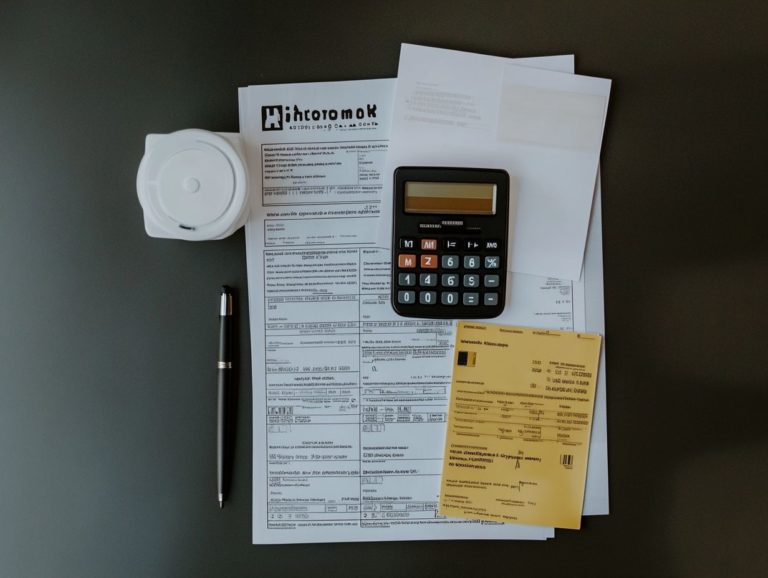Tax Tips for Freelancers Who Work Abroad
Freelancing presents a world of flexibility and adventure, particularly for those who opt to work abroad.
However, navigating tax obligations as a freelancer in a foreign country can be quite overwhelming. This article demystifies the essentials of freelancing and taxes, guiding you through everything from understanding your tax responsibilities to maximizing your deductions.
Key considerations involve residency, tax treaties, and the foreign income exclusion. With practical tips and strategies at your disposal, you ll be well-prepared to minimize your tax burden and concentrate on what truly matters your work.
Contents
- Key Takeaways:
- Overview of Freelancing and Taxes in the Global Framework
- Tax Considerations for Working Abroad
- Maximizing Tax Deductions as a Freelancer
- Filing Taxes as a Freelancer Working Abroad
- Tax Tips for Minimizing Liability
- Frequently Asked Questions
- What are some tax tips for digital nomads who work abroad?
- Do I need to pay taxes in both my home country and the country I am working in?
- Are there any tax exemptions or credits available for freelancers working abroad?
- What are some common expenses that freelancers working abroad can claim as deductions?
- Do I need to file taxes in the country I am working in as well?
- What happens if I do not file taxes while working abroad?
Key Takeaways:

- Understand your tax obligations as a freelancer, both in your home country and in the country where you are working abroad, especially regarding foreign taxes.
- Take advantage of tax treaties and the foreign income exclusion to minimize your tax liability as a freelancer working abroad.
- Keep track of your expenses and take advantage of common deductions to maximize your tax deductions as a freelancer.
Are you ready to take control of your taxes while freelancing abroad?
Overview of Freelancing and Taxes in the Global Framework
Freelancing has emerged as a favored option for many in the United States, particularly digital nomads who relish the freedom of remote work while grappling with the intricacies of foreign taxes and self-employment tax obligations.
As a freelancer, you engage with a diverse array of clients around the globe, which brings unique tax considerations that can profoundly impact your income and overall business strategy.
It s crucial for you to grasp the nuances of foreign tax credits, income exclusions, self-employment, and IRS compliance to ensure your financial health and stability in your freelance business.
Understanding Tax Obligations for Freelancers
As a freelancer, you ll need to navigate the various tax obligations set forth by the IRS, including self-employment tax and income tax reporting, both of which can significantly impact your net earnings.
These obligations demand careful tracking of your income and expenses throughout the year to maintain compliance and avoid any potential penalties. For U.S. citizens engaged in freelance work, accurate tax forms, such as Schedule C, are essential for effectively reporting your income. Additionally, understanding the tax implications of freelance side hustles is vital, especially regarding quarterly estimated taxes, as any underpayment can result in interest and fines that you’d rather avoid.
Navigating these complexities protects your financial stability and enables you to maximize deductions available for your business-related expenses.
Overlooking these responsibilities could lead to serious repercussions, including hefty fines and complications with future tax filings.
Tax Considerations for Working Abroad
Working abroad as an international freelancer means understanding the tax implications of your foreign income. Know your eligibility for the foreign tax credit and the nuances of different travel visas.
Being informed can significantly impact your financial well-being and ensure a smoother experience while you pursue your endeavors overseas.
Residency and Tax Treaties
Understanding your residency status in a foreign country is essential, as it shapes your tax obligations and determines whether you can take advantage of relevant tax treaties or totalization agreements.
This determination is pivotal in managing your foreign income, as it directly affects how the income you earn abroad is taxed. For freelancers navigating international waters, knowing whether you fall under the category of resident or non-resident can lead to significant tax savings.
Numerous countries have established tax treaties designed to prevent double taxation, allowing self-employed individuals like you to avoid being taxed by both your home country and the foreign jurisdiction. By leveraging these agreements, you can often minimize your tax liabilities on earnings generated from clients overseas. Additionally, understanding tax tips for freelancers in the gig economy can ultimately enhance your financial outcomes in a complex global landscape.
Foreign Income Exclusion

The foreign income exclusion allows you, as a U.S. citizen, to exclude a certain amount of your foreign earnings from taxable income. This ultimately lightens your overall tax burden and facilitates freelance growth.
This financial relief benefits freelancers working abroad. You can concentrate on your projects without the constant worry of excessive taxation. To qualify, you must meet specific criteria, such as the physical presence test or the bona fide residence test, which show your connection to a foreign country. Knowing these requirements, along with tax planning tips for new freelancers, can save you money and keep you compliant with IRS regulations.
When you apply for this exclusion, you can significantly influence your tax filings. Make sure the exclusion is accurately reported on Form 2555, which is a form used to report your foreign earned income. This meticulous approach not only reduces your tax liabilities but also paves a clearer financial path during your international assignments. For more insights, check out this guide on how to prepare for tax season as a freelancer.
Maximizing Tax Deductions as a Freelancer
You can dramatically reduce your tax liabilities by maximizing the available tax deductions related to your freelance work. This includes various business expenses that contribute to your growth and operational efficiency.
Using these deductions not only boosts your finances but also lays the groundwork for your freelance success.
Common Deductions for Freelancers
Common deductions for freelancers can cover a variety of expenses, from your home office space to work-related supplies. Educational courses that enhance your business strategy and support your portfolio building also qualify.
These deductions do more than just trim your taxable income; they can offer substantial financial relief. This allows you to reinvest in your ventures, including business opportunities that arise from remote jobs.
For instance, if you work from a designated area in your home, you can deduct a portion of your rent or mortgage, along with utilities and internet costs, as long as these expenses are used solely for business purposes.
Any software or tools essential for completing your projects can also be written off. Additionally, educational expenses like workshops or online courses are deductible, especially if they enhance skills directly related to your freelance services.
By understanding these various categories of deductions, you can fine-tune your financial strategies. This ultimately fuels your growth in a competitive landscape.
Keeping Track of Expenses
Keeping meticulous records of your business expenses is essential for maximizing deductions and streamlining your filing process. This often involves effectively managing your financial accounts and administrative tasks.
Consider using dedicated software tools to track your expenses accurately and efficiently. By integrating budgeting techniques like the zero-based budget method or the envelope system, you can gain clearer insights into your spending patterns.
Maintaining detailed records is not just key to maximizing deductions; it’s crucial for accurate tax reporting. This helps prevent potential issues with tax authorities. Consulting a tax professional can offer you tailored guidance, ensuring you take full advantage of all available deductions while remaining compliant with freelancer tax tips for seasonal work regulations.
Filing Taxes as a Freelancer Working Abroad
Filing taxes as a freelancer working abroad requires you to grasp essential deadlines and the specific tax forms mandated by both the IRS and the foreign country s tax authority. It’s crucial to navigate these requirements carefully to ensure compliance and protect your financial interests.
Important Deadlines and Forms

You must remain vigilant about crucial tax filing deadlines. Missing them can lead to penalties and complications with the IRS or the tax office in your country. Understanding these timelines is essential for compliance and for maintaining robust financial practices.
Each country has its own set of requirements regarding income reporting and filing, making it vital to know those dates. In the United States, for instance, freelancers typically submit quarterly estimated tax payments by mid-April, mid-June, mid-September, and the following January. To effectively manage your finances, consider learning how to save for taxes as a freelancer.
For international freelancers, being aware of any forms your home country may require is equally important. This might include specifics like the 1099 for U.S.-based workers or equivalent forms elsewhere. Utilizing freelancer tax strategies for increased savings can help you manage these obligations with care and avoid costly pitfalls!
Seeking Professional Help
Engaging a tax professional can be an invaluable asset for freelancers, particularly those working abroad. They can help you navigate the complex rules of financial accounts, IRS regulations, and international tax forms, essential for maintaining work-life balance.
These experts provide tailored advice and support, ensuring you grasp your specific tax obligations and meet compliance requirements. By collaborating with a knowledgeable professional, you can effectively manage your tax liabilities and reduce the risk of costly mistakes that may arise from misinterpretations or oversights.
These specialists stay informed about the ever-evolving tax laws, offering insights that empower you to make informed financial decisions. This partnership builds your confidence in handling taxes and frees you to concentrate on your projects, knowing your financial affairs are in capable hands.
Tax Tips for Minimizing Liability
Embracing effective tax strategies can greatly reduce your liability as a freelancer. This approach allows you to optimize your earnings while ensuring full compliance with tax regulations. Proper management of business expenses is also essential.
Strategies for Reducing Tax Burden
Implementing strategies to reduce your tax burden can open the door to various business opportunities while ensuring compliance with health insurance requirements, especially regarding foreign taxes for international clients.
By understanding the nuances of tax deductions available for home office expenses, equipment purchases, and professional development, you can significantly lower your taxable income. Knowing how health insurance impacts your situation, such as qualifying for premium tax credits, strengthens your financial stability. Additionally, understanding the tax implications of freelancing while traveling can be beneficial for managing foreign income.
Exploring new business avenues like diversifying your service offerings or collaborating with other professionals not only enhances your revenue streams but also contributes to a well-rounded, sustainable freelance career. This is particularly important in the growing freelance market.
Ultimately, maintaining awareness of these aspects fosters your overall financial health and resilience in what can often feel like an unpredictable market, especially for international freelancers.
Frequently Asked Questions
What are some tax tips for digital nomads who work abroad?

1. Keep track of your income and expenses: As a freelancer working abroad, it’s vital to maintain detailed records of your income and expenses for tax purposes. This practice will make it easier to calculate your taxable income and claim any deductions or credits you may qualify for.
Stay informed and take control of your financial future today!
Do I need to pay taxes in both my home country and the country I am working in?
It depends on where you pay taxes. If you are a tax resident of your home country, you may need to pay U.S. federal taxes on your worldwide income.
If you reside in the country where you work, you typically only pay taxes on income earned there.
Are there any tax exemptions or credits available for freelancers working abroad?
Check for tax treaties! Many countries have agreements to avoid double taxation for U.S. citizens working overseas.
Research whether your home country has a tax treaty with your host country to see if you’re eligible for exemptions or credits, like the foreign income exclusion, which allows you to avoid taxes on some foreign earnings.
What are some common expenses that freelancers working abroad can claim as deductions?
Travel expenses can often be claimed! If you travel for work, you may be able to deduct airfare, accommodations, and meals.
These expenses must directly relate to your work and be necessary for earning income. Understanding your client contracts can help clarify which expenses qualify.
Do I need to file taxes in the country I am working in as well?
Your filing requirements depend on the duration of your stay. If you’re in a foreign country for an extended period, you may need to file taxes there.
Research the tax laws of the country where you are working to understand your filing obligations, including work permits and freelance visas.
What happens if I do not file taxes while working abroad?
You could face penalties and fines! Failing to file taxes while overseas can lead to serious repercussions, just like not filing in your home country.
It’s crucial to comply with the tax laws of the country you are working in to avoid legal issues.






